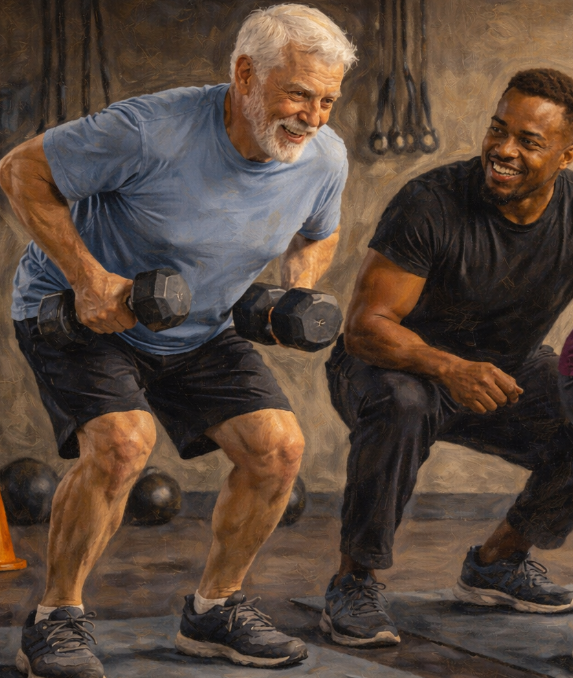Why Balance Training Can Help You Live Longer
- Anabel Cruz

- Oct 31, 2025
- 4 min read
You’ve probably heard that strength and cardio are important for your health - but balance training might be just as vital when it comes to how long you live. New research shows that your ability to stay upright and steady says a lot about your overall health, coordination, and even your longevity. Let’s break down what science says about why balance matters and how you can use it to live a longer, healthier life.
What Balance Says About Your Health
Balance isn’t just about avoiding falls. It’s actually a strong reflection of how well your body systems - muscular, neurological, and cardiovascular - are working together.
One long-term U.S. study found that adults with balance disorders had a significantly higher risk of dying from all causes, especially from heart disease and cancer. In another study of middle-aged adults, those who couldn’t stand on one leg for just 10 seconds were almost twice as likely to die early as those who could.
That’s pretty wild when you think about it - something as simple as standing on one leg can tell you a lot about how your body is aging. Poor balance may not cause early death directly, but it’s a powerful sign that the systems responsible for strength, coordination, and mobility are starting to decline.
Why Balance Training Helps You Live Longer
1. Fewer Falls and Injuries
As we age, falls become one of the leading causes of injury and death. Improving your balance through training dramatically reduces your risk of falls and fractures, keeping you mobile and independent for longer.
2. Stronger Muscles and Better Coordination
Balance training doesn’t just make you steadier - it strengthens the muscles and reflexes that protect you from losing your footing in the first place. Studies show that combining resistance and balance training improves lower-body strength and dynamic stability more than strength training alone.
3. Staying Active and Independent
When you have confidence in your balance, you’re more likely to stay active. That means you keep walking, lifting, and doing the things you love without fear of falling. Physical activity itself is one of the biggest predictors of a longer life, and balance training helps make that possible well into older age.
4. Boosting Overall Body Function
Researchers have also found that balance ability reflects how well your heart, nervous system, and sensory systems are functioning. Training your balance might not just improve coordination - it could be strengthening deeper systems in the body that play a role in how you age.
How to Train Your Balance
The good news is that balance training doesn’t require fancy equipment or a gym membership. Here’s what the research suggests:
How often: Aim for at least three times per week, and continue for at least eight weeks to start seeing noticeable improvements.
Exercises to try:
Stand on one leg for 10 - 30 seconds.
Practice a heel-to-toe walk (like walking a straight line).
Shift your weight side to side or front to back while standing.
Try single-leg mini squats or step-ups.
Add balance challenges to your daily routine, like standing on one leg while brushing your teeth.
For more advanced training, try combining balance with strength work - like single-leg deadlifts, squats on an unstable surface, or exercises on a BOSU ball.
Safety tip: Always have a stable object nearby to hold onto when you start, especially if you’re new to balance work or recovering from injury.
A Few Things to Keep in Mind
It’s important to remember that just because balance and longevity are linked doesn’t mean one directly causes the other. Poor balance might be a symptom of underlying issues such as cardiovascular weakness or neurological decline. But what’s clear is that people who move more, train more, and maintain balance as they age tend to live longer, healthier lives.
And you don’t need to spend hours doing it - just a few minutes a day can make a real difference.
The Bottom Line
Balance is one of the most underrated indicators of overall health. It predicts how you move, how well you age, and even how long you live. Training your balance keeps your muscles, nervous system, and confidence strong. It helps you stay independent, active, and free from injury - and all of that adds up to more years doing what you love.
So next time you hit the gym, don’t skip the balance work. It could be one of the best long-term health investments you’ll ever make.
References
Agrawal Y. et al. Association of Balance Function With All-Cause and Cause-Specific Mortality. JAMA Otolaryngol Head Neck Surg. 2022.
Harvard Health Publishing. Better Balance May Mean a Longer Life. 2022.
Jiang G. et al. A 24-Week Combined Resistance and Balance Training Program Improves Physical Function in Older Adults. J Strength Cond Res. 2025.
Shailendra S. et al. Resistance Training and Mortality Risk: A Systematic Review and Meta-Analysis. Am J Prev Med. 2022.
Rabelo V.C.P. et al. The Effects of Physical Exercise on Balance and Prevention of Falls in Older Adults. J Clin Med. 2020.
Greco C. et al. The Effect of Balance and Coordination Exercises on Quality of Life of Older Adults. Front Aging Neurosci. 2019.
Stanford Center on Longevity. The Role of Physical Activity in Successful Aging.
Ready to Take the Next Step?
If you want to move better, feel stronger, and live longer, balance training should be part of your routine - and we can help you get started.
At AqilFitness Training Solutions in Grand Prairie, TX, our personal trainers specialize in functional movement, balance development, and strength programs that keep you active for life. Whether you’re an athlete, a parent, or just want to move with more confidence, we’ll build a plan that fits your goals.
👉 Book your first personal training session today and experience how improving your balance can improve every part of your life.






Comments